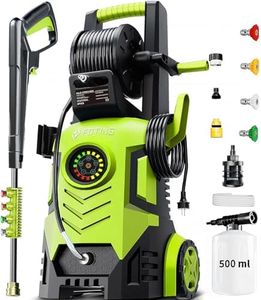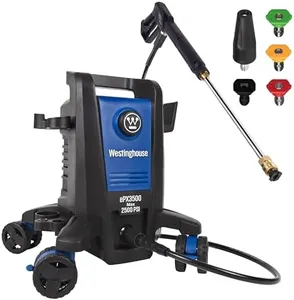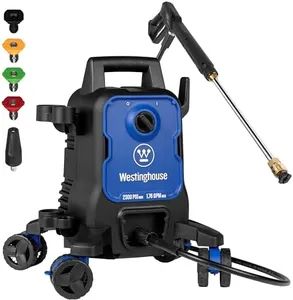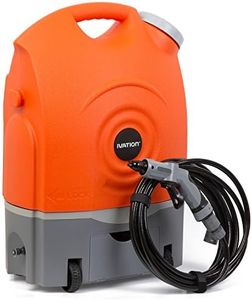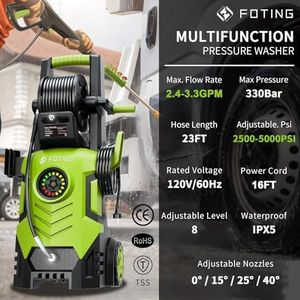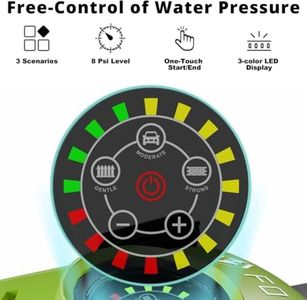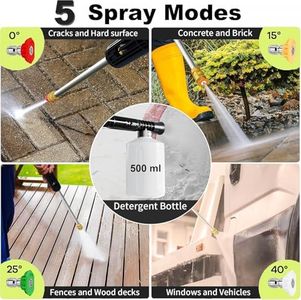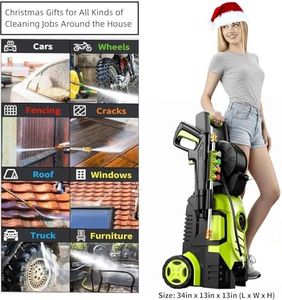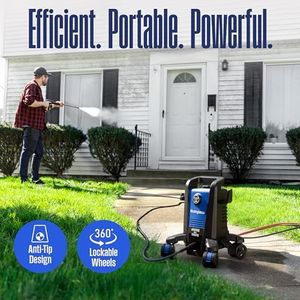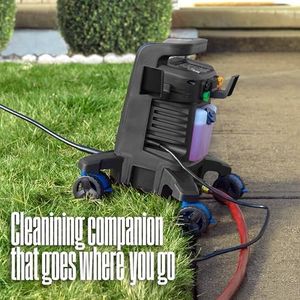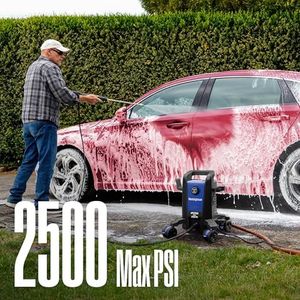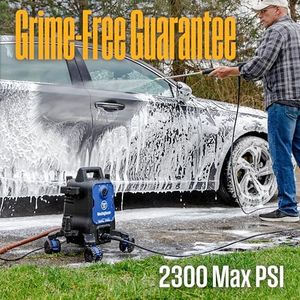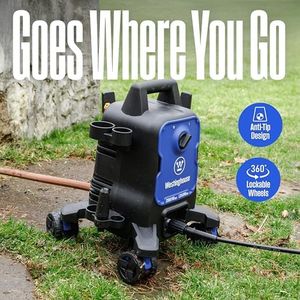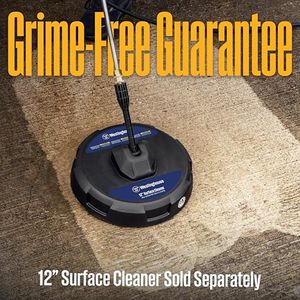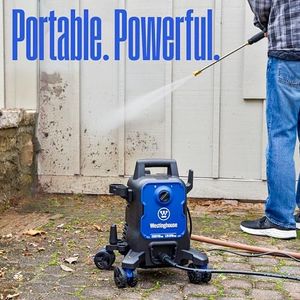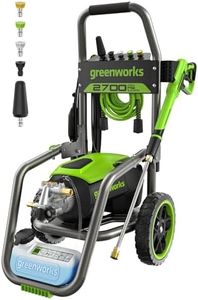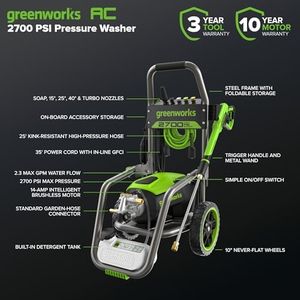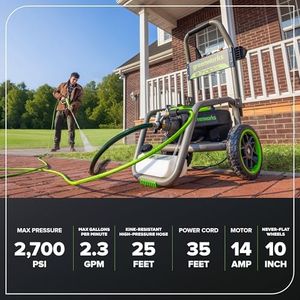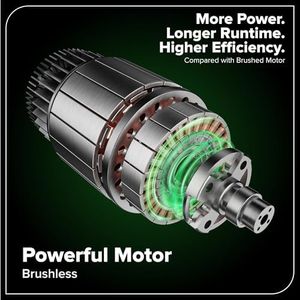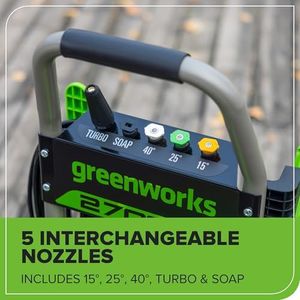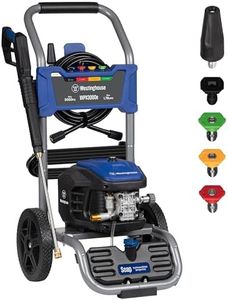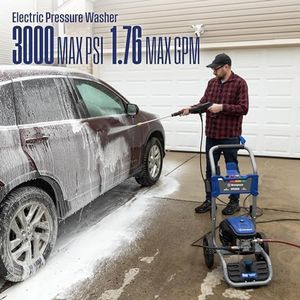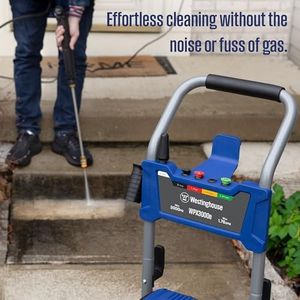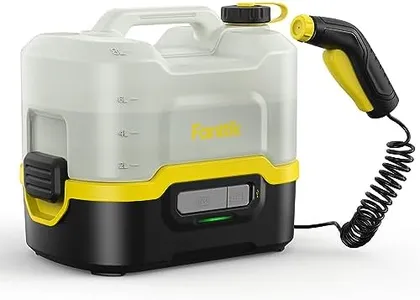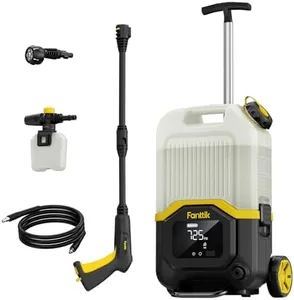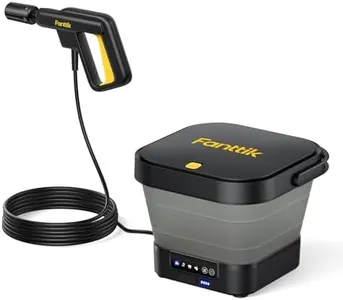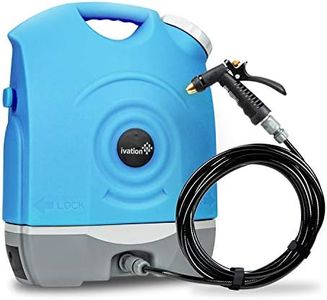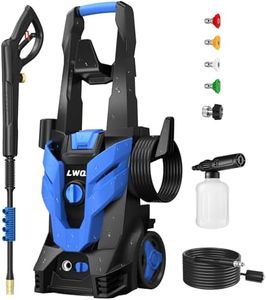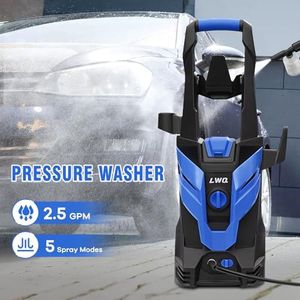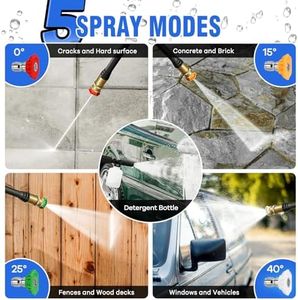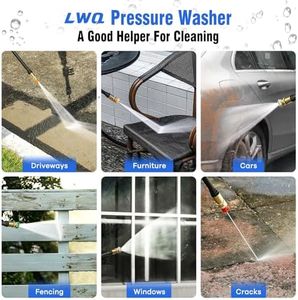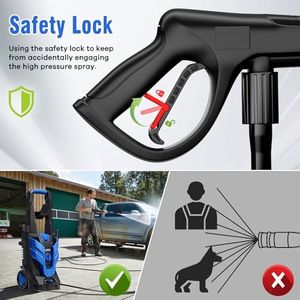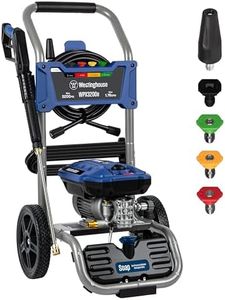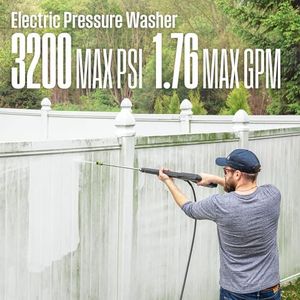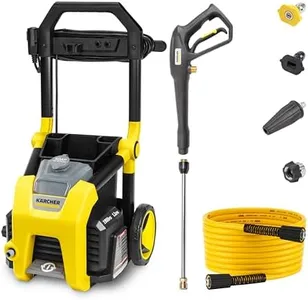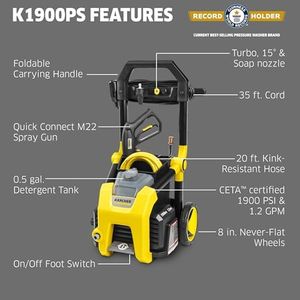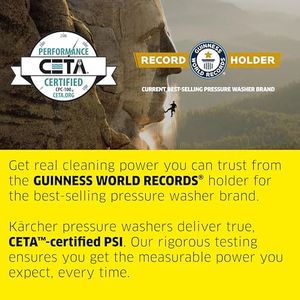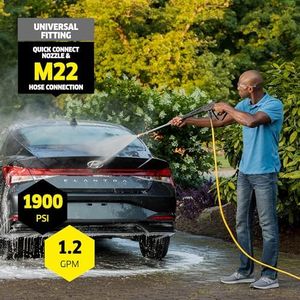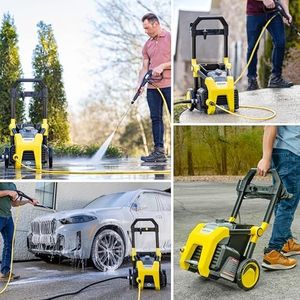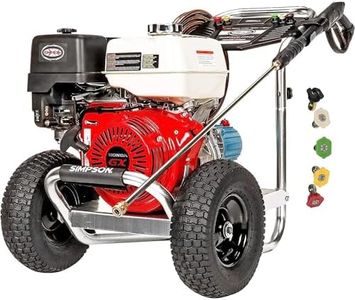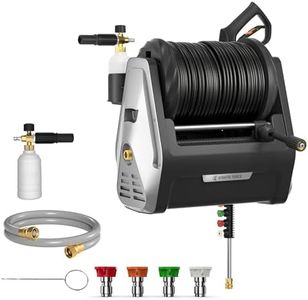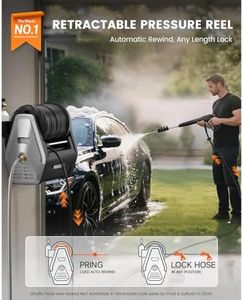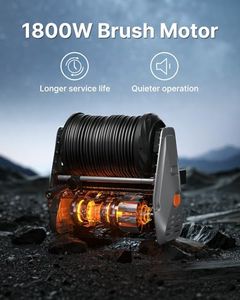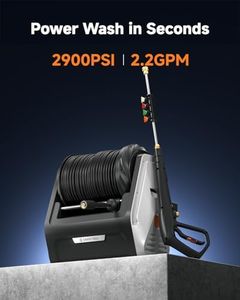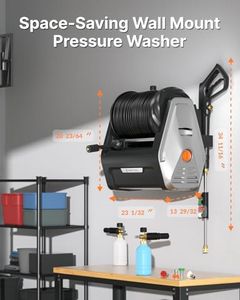10 Best Electric Power Washers 2026 in the United States
Winner
2025Upgraded Pressure Washer 5000PSI with Adjustable Touch Screen 8 Level, 34" Tall, 4 Quick Connect Nozzles,Inlet Hose&Filter&500mlFoam Cannon for Cars/Fences/Driveways/Home Cleaning,Yellow
The FOTING 2025 Upgraded Pressure Washer is a powerful electric model offering up to 5000 PSI pressure and a water flow rate of 3.3 gallons per minute. This level of pressure is excellent for heavy-duty cleaning tasks like washing cars, driveways, fences, and outdoor equipment. It includes four quick connect nozzles and an adjustable touchscreen that lets you select from eight pressure levels ranging from 2500 to 5000 PSI, making it versatile for different surfaces. The 23-foot hose and 16-foot power cable provide decent reach, helping you clean larger areas without frequently changing outlets. Designed with user comfort in mind, it weighs 23 pounds and features a wheeled base for easier maneuverability despite its size. The built-in detergent tank with a 500ml foam cannon adds convenience for applying soap during cleaning. Safety features like the Total Stop System automatically shut off the motor when not in use, which helps save energy and prolongs the machine’s life.
Most important from
249 reviews
Westinghouse ePX3500 Electric Pressure Washer, 2500 Max PSI 1.76 Max GPM with Anti-Tipping Technology, Onboard Soap Tank, Pro-Style Steel Wand, 5-Nozzle Set, for Cars/Fences/Driveways/Home/Patios
The Westinghouse ePX3500 Electric Pressure Washer offers a robust cleaning performance with a maximum pressure of 2500 PSI and a flow rate of up to 1.76 GPM, making it suitable for a range of cleaning tasks such as cars, fences, driveways, and patios. The included pro-style steel wand and five quick-connect nozzles provide versatility for different cleaning needs, from tough stains to gentle rinsing. At 21 pounds and with a compact design, this washer is easy to maneuver and store, enhanced by its four quick-lock wheels and anti-tipping technology for stability during use.
Most important from
18397 reviews
Westinghouse ePX3100 Electric Pressure Washer, 2300 Max PSI 1.76 Max GPM with Anti-Tipping Technology, Onboard Soap Tank, Pro-Style Steel Wand, 5-Nozzle Set, for Cars/Fences/Driveways/Home/Patios
The Westinghouse ePX3100 Electric Pressure Washer is a powerful and versatile cleaning tool. With a maximum pressure of 2300 PSI and a flow rate of 1.76 GPM, it offers substantial cleaning power for various tasks around the house such as cleaning cars, fences, driveways, homes, and patios. The unit includes a pro-style steel extendable wand and comes with five quick-connect nozzles, providing flexibility for different types of cleaning jobs. Its 25-foot hose length is adequate for most home use scenarios. The onboard 20 oz soap tank allows for easy application of detergents, enhancing its effectiveness on tough stains and dirt.
Most important from
18395 reviews
Top 10 Best Electric Power Washers 2026 in the United States
Winner
2025Upgraded Pressure Washer 5000PSI with Adjustable Touch Screen 8 Level, 34" Tall, 4 Quick Connect Nozzles,Inlet Hose&Filter&500mlFoam Cannon for Cars/Fences/Driveways/Home Cleaning,Yellow
2025Upgraded Pressure Washer 5000PSI with Adjustable Touch Screen 8 Level, 34" Tall, 4 Quick Connect Nozzles,Inlet Hose&Filter&500mlFoam Cannon for Cars/Fences/Driveways/Home Cleaning,Yellow
Chosen by 1169 this week
Westinghouse ePX3500 Electric Pressure Washer, 2500 Max PSI 1.76 Max GPM with Anti-Tipping Technology, Onboard Soap Tank, Pro-Style Steel Wand, 5-Nozzle Set, for Cars/Fences/Driveways/Home/Patios
Westinghouse ePX3500 Electric Pressure Washer, 2500 Max PSI 1.76 Max GPM with Anti-Tipping Technology, Onboard Soap Tank, Pro-Style Steel Wand, 5-Nozzle Set, for Cars/Fences/Driveways/Home/Patios
Westinghouse ePX3100 Electric Pressure Washer, 2300 Max PSI 1.76 Max GPM with Anti-Tipping Technology, Onboard Soap Tank, Pro-Style Steel Wand, 5-Nozzle Set, for Cars/Fences/Driveways/Home/Patios
Westinghouse ePX3100 Electric Pressure Washer, 2300 Max PSI 1.76 Max GPM with Anti-Tipping Technology, Onboard Soap Tank, Pro-Style Steel Wand, 5-Nozzle Set, for Cars/Fences/Driveways/Home/Patios
Greenworks Pro Brushless 2700 PSI (CSA Certified) 2.3 GPM Max / 1.2 GPM Electric Pressure Washer (Foldable Handles, Rugged Steel Frame, 25 FT Hose, 35 FT GFCI Power Cord)
Greenworks Pro Brushless 2700 PSI (CSA Certified) 2.3 GPM Max / 1.2 GPM Electric Pressure Washer (Foldable Handles, Rugged Steel Frame, 25 FT Hose, 35 FT GFCI Power Cord)
Westinghouse WPX3000e Electric Pressure Washer, 3000 Max PSI and 1.76 Max GPM, Induction Motor, Onboard Soap Tank, Spray Gun and Wand, 5 Nozzle Set, for Cars/Fences/Driveways/Homes/Patios/Furniture
Westinghouse WPX3000e Electric Pressure Washer, 3000 Max PSI and 1.76 Max GPM, Induction Motor, Onboard Soap Tank, Spray Gun and Wand, 5 Nozzle Set, for Cars/Fences/Driveways/Homes/Patios/Furniture
Pressure Washer, Power Washer with 4 Quick Connect Nozzles, High Pressure Cleaning Machine with Foam Cannon for Cars/Fences/Driveways/Patios/Home Cleaning, Blue
Pressure Washer, Power Washer with 4 Quick Connect Nozzles, High Pressure Cleaning Machine with Foam Cannon for Cars/Fences/Driveways/Patios/Home Cleaning, Blue
Westinghouse WPX3200e Electric Pressure Washer, 3200 Max PSI and 1.76 Max GPM, Induction Motor, Onboard Soap Tank, Spray Gun and Wand, 5 Nozzle Set, for Cars/Fences/Driveways/Homes/Patios/Furniture
Westinghouse WPX3200e Electric Pressure Washer, 3200 Max PSI and 1.76 Max GPM, Induction Motor, Onboard Soap Tank, Spray Gun and Wand, 5 Nozzle Set, for Cars/Fences/Driveways/Homes/Patios/Furniture
Kärcher Pressure Washer K1900PS, CETA Certified, 3 Spray Nozzles, Detergent Tank, for Cars, Driveways, Siding, Patios, 1.2 GPM
Kärcher Pressure Washer K1900PS, CETA Certified, 3 Spray Nozzles, Detergent Tank, for Cars, Driveways, Siding, Patios, 1.2 GPM
Simpson Cleaning 4200 PSI Gas Pressure Washer, 4.0 GPM Power Washer for Commercial Use, Honda GX390 Engine, 50-Foot Steel-Braided Hose, Aluminum Series, 49-State (ALH4240)
Simpson Cleaning 4200 PSI Gas Pressure Washer, 4.0 GPM Power Washer for Commercial Use, Honda GX390 Engine, 50-Foot Steel-Braided Hose, Aluminum Series, 49-State (ALH4240)
Giraffe Tools Wall Mounted Pressure Washer G30 with Upgraded 1800W Motor, Max 2900 PSI, 2.2 GPM Electric Power Washer with 100ft Retractable Black Pressure Hose, Automatic Rewind, Light Silver
Giraffe Tools Wall Mounted Pressure Washer G30 with Upgraded 1800W Motor, Max 2900 PSI, 2.2 GPM Electric Power Washer with 100ft Retractable Black Pressure Hose, Automatic Rewind, Light Silver
Our technology thoroughly searches through the online shopping world, reviewing hundreds of sites. We then process and analyze this information, updating in real-time to bring you the latest top-rated products. This way, you always get the best and most current options available.

